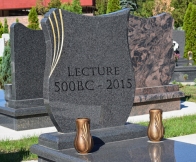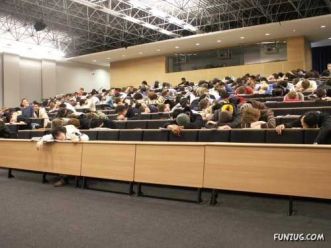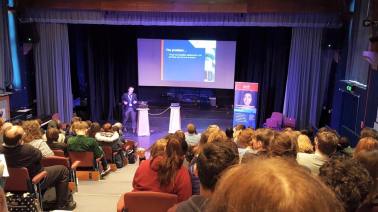In about 1993, when I was taking my first tentative steps in University teaching, I was  invited to a day of staff development training. My memory of that day (indeed, much of that century) is a little hazy, but I do remember being told that that age of the lecture was over. Apparently the way we teach had remained the same since ancient times, but now, in this slightly overheated room, with our bellies full of noxious pre-Cappuccino-age coffee-ish liquid, things were going to change. Now was the time for active learning!
invited to a day of staff development training. My memory of that day (indeed, much of that century) is a little hazy, but I do remember being told that that age of the lecture was over. Apparently the way we teach had remained the same since ancient times, but now, in this slightly overheated room, with our bellies full of noxious pre-Cappuccino-age coffee-ish liquid, things were going to change. Now was the time for active learning!
It didn’t matter that this paean to less passive learning was delivered in an entirely passive way. We sat, picking our nails, pre-smartphone, staring out the window, counting the ceiling tiles, imagining potential cruel deaths for the speaker (that last one might just
 have been me..). We were instructed that students learn better when they do. It wasn’t clear what they should do, and how this might vary between philosophy and photography, or criminology or social work. It wasn’t a prescription, it was a (slightly dull) rallying cry. My memory of that particular event fades out there, but ever since we have seen an intermittent foretelling of the imminent death of the lecture. Articles around it crop up, everyone has their pointless say in the comments, and then the topic is briefly eclipsed by other regulars, till next time. Leaving aside my substantial anxiety about the current vogue for ‘trads vs. progressives’ on ‘edu-twitter’** I want to remain provisionally pragmatic here.
have been me..). We were instructed that students learn better when they do. It wasn’t clear what they should do, and how this might vary between philosophy and photography, or criminology or social work. It wasn’t a prescription, it was a (slightly dull) rallying cry. My memory of that particular event fades out there, but ever since we have seen an intermittent foretelling of the imminent death of the lecture. Articles around it crop up, everyone has their pointless say in the comments, and then the topic is briefly eclipsed by other regulars, till next time. Leaving aside my substantial anxiety about the current vogue for ‘trads vs. progressives’ on ‘edu-twitter’** I want to remain provisionally pragmatic here.
Of course, the hymn of praise to active learning I referred to here, was delivered in bad lecture format. Lots, sadly, still are. But as a pragmatist, I am happy to embrace non-rubbish lectures: some of the best and worst learning experiences of my life have been sat in lectures. Likewise, I have had both awesome, revelatory sessions where I have been active and done stuff. I have also had long, cringe-making hours of pointless, hat-wearing, pain-storming, what-the-hell-am-I-doing idiocy. I am not going to jump into the debate on ‘are lectures good or what?’, or the weird contemporary obsession with lecture-capture*, but talk about how we can do something with the lecture format that is often presumed to be the reserve of more active sessions. That is differentiation.
Race and Pickford note that ‘..it is difficult to differentiate delivery in a large lecture..’ (Race, P & Pickford, R, Making Teaching Work, Sage, 2007. p.127) They then go on to offer a range of, useful, ways of differentiating the learning experience in more active learning contexts. There is a lot fo potential here, much of its actual outworking being quite specific to disciplines, and what they need students to be able to achieve. However, I want to pause and think about what we can do in a lecture format.
As I indicated, I like to attend (non-rubbish) lectures. I enjoy giving lectures. Students quite often like them and they have (when done well) substantive benefits that I won’t rehearse here (cf. all those articles/comment threads I mentioned earlier) So, if we see them not disappearing – can we really offer opportunities within them for both students to be stretched, successfully, at different levels of understanding and attainment? Lectures seem like a broadcast format. I throw stuff at the audience, and they catch it. Or don’t. Well, that sounds horribly simplistic, and I don’t think it’s that hard to think a bit more about the way we throw it, and what we throw.
Most obviously (other than the really most obvious notion of signposting further reading), I’d suggest, we never just make a point/offer an explanation, and just move on. Surely we never do this anyway. We repeat. We give the basic idea, then we try and explain it, maybe with an example. Then we repeat the basic point. We flag where it is going to fit into the broader curriculum. This already offers a differentiated experience. For students struggling, we have reiterated out core point, but our overview point allows more conceptually engaged students to begin synthesizing the content with other sessions. This is partly why I remain an advocate of establishing with a class just what it is we hope to achieve in a lecture, at the outset. This reminds us all of the point of the topic, and also allows some to start making those broader connections with other topics. Repetition, with nuances and extension, is at the core of embedding the learning, but offering chances to deepen understanding and for students to take more from the point.
 This next point may seem obvious, but judging from some sessions I have been to, maybe it isn’t. When using examples, ones with a narrative seem hugely more memorable. That seems like a straightforward teaching point. People connect with stories. I have had people tell me narrative examples I used, years later, long after I have forgotten them! But how does placing a narrative frame, giving our fictional character a name, and two sentences of backstory, help with differentiation? If we use narrative examples as the core of our repetition, can you retell the story with a modification that extends it? This acts to reinforce original point – and gives scope to take it on, to offer a more sophisticated appreciation, that allows of more qualification, argument and depth. But the narrative arc sticks for all; allowing our well-embedded interpretative apparatus to draw out meaning at a level that suits our level of ability/understanding.
This next point may seem obvious, but judging from some sessions I have been to, maybe it isn’t. When using examples, ones with a narrative seem hugely more memorable. That seems like a straightforward teaching point. People connect with stories. I have had people tell me narrative examples I used, years later, long after I have forgotten them! But how does placing a narrative frame, giving our fictional character a name, and two sentences of backstory, help with differentiation? If we use narrative examples as the core of our repetition, can you retell the story with a modification that extends it? This acts to reinforce original point – and gives scope to take it on, to offer a more sophisticated appreciation, that allows of more qualification, argument and depth. But the narrative arc sticks for all; allowing our well-embedded interpretative apparatus to draw out meaning at a level that suits our level of ability/understanding.
A pre-lecture reflection that I find helps me, is wondering: What is the minimum I want taken from the room by all there: if they only take away one thing – what is the most vital thing? Then, if they only take a handful of points, what should they be? As I work out from this, core, baseline aspiration, to the fuller appreciation I hope at least some present are able to have of the topic, I can use this as a tool for my structure.
And structure matters. I have a particular memory of sitting in A-level maths lessons, alongside my cleverer friend Ivan, trying to follow the teacher. The lessons began with a straightforward idea, and then moved, in a linear fashion, to the end of that topic. Of the 45 minute lesson, I’d usually last about 8 minutes. Then I’d miss something. Something wouldn’t work in my head, or I’d be busy writing down the last thing, miss an explanation. And I was lost. Nothing from that point on would make any sense to me. At all. This is, I fear, a common experience. The cleverer students would hang on to the very end, with the rest exiting their attention along the way, as they lost track. This is differentiation of a sort. But it is a hugely wasteful. Minutes, hours, weeks, years, of wasted time. No doubt some of the daydreaming in those lost hours bears fruit, but my main memory is not of imaginative flights of creative speculation, but of grim clock-watching, while my profound lack of numerical aptitude slowly dawned on me.
If our lecture moves from a simple idea, to the most complex form of the notion, in an ever-harder linear fashion, we will ‘drop’ the class as we go – being just left with the most able for the latter portions. Is this our only option? Especially if we want to have, as I convinced we should have, high expectations of what our students can achieve. I think there are alternatives. One I like is to think of is that we can reject a session plan of a single, linear, getting-harder-by-the-minute model. Thinking of a whole module, maybe an individual lecture shouldn’t drive home one point, but circle more than one, as part of more integrative drive towards the ultimate learning outcomes. What do I mean by this?
What I have in mind is not having a topic per week, and driving the difficulty relentlessly up over the period of an hour. It may be that you have three topics over three weeks, but you address all three each week. You have 20 minutes on each topic in week one, then the same in weeks two and three. Each week has more challenging material, and students need to attend: but if a student is lost, after the week two section on topic three – they have a whole week to remedy this. This relies on them having means of remedying that – but the VLE can have summaries, they can contact the tutor, or review audio-visual material, or you know, visit the library and look in a book. This won’t work for all topics, and it is best where a course has an integrated set of content that fits this method. Is it even differentiation still? The aspiration is to give all students the chance to come all the way with us to the most challenging material; and it means that someone whop loses the thread of where a lecture is travelling loses a lot less time.
There are other things, of course, that can help avoid this ‘lose the thread, waste the rest of the lecture looking at your feet’ experience: regular recapping, embedding and summarising helps.
There is no question that differentiation in lecture formats can be challenging, and students won’t feel their experience to be as personalised or bespoke as in some approaches, but there are things we can try to harness the (disputed, but I think hard to ignore) benefits of good lecturing, while ensuring we take as much of the class along, as much of the time, and help everybody present take as much as possible from the session.
—
*Seriously, why? I can see that remote learners, students with a range of learning needs, and distance students need ways of accessing the curriculum that match their specific circumstances. But recorded lectures? I think that capturing them can have benefits, but to really serve these groups well, to give them what they deserve, we can do better: shorter, video-interview topic summaries, slideshows with tutor voiceovers, screen-captured, narrated, close readings of tests, how-to videos: all these seem more likely to help the groups mentioned. Lecture capture has a place, but I fear an alliance of zealots, commercial interests, and think-of-the-staffing-ratio calculations may congeal to overly assess the size and value of its place.
** Where people badge their allegiance to ‘pedagogically conservative’ or ‘profoundly progressive’ camps on their blogs/bio. I worry that this is a debate that rages without a concern for how the delivery method relates to ideas of inclusivity, and fundamental ethical aspects of educational thought. But maybe that’s a blog for another day…
One lecture absolutely stands out for me as an utterly life-changing, illuminating, revelatory experience for me in my university career. The lecture was given by Dr Gavin Kendall.
It was the middle of a series of lectures on the history of psychology. The series had started with a spiel about how the ancient Greeks ruminated philosophically about the nature of mind and perception, and then went straight to twentieth century behaviourists etc. Something about this had felt “off” but I couldn’t put my finger on why, at the time.
Gavin came in and delivered an amazing lecture on Foucault, and the history of madness, and how the notion of normal perception & cognition had been arrived at by first defining what was not normal, and showed us how the theory of mind had developed via Locke and the alienists of the 18th century. It was like a revelation.
It was also well-illustrated (lots of 18th century engravings of mad people). It was probably also a well-structured lecture (too long ago now, don’t remember).
But I came out of that lecture reeling and dazzled and absolutely fizzing with ideas.
LikeLike
There’s a lot to say about this topic, which you’ve covered quite well and evenly. I’ll just say one thing.
When I’ve redesigned classes so that there was a lot more emphasis on “active learning” and had very short lecture parts – what the ed experts were pushing hard for at the time – I’d have students come up and ask “when are you going to actually do lectures on the material”? I’d ask them why and invariably the answer would be something like “we’re here to learn, and you are supposed to know about this stuff. . . .The activities are fun, but I don’t feel like I’m really understanding the material”
LikeLiked by 1 person
Ah, fun. See https://davewebster.org/2017/08/25/saying-no-to-fun/
LikeLike